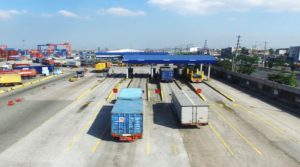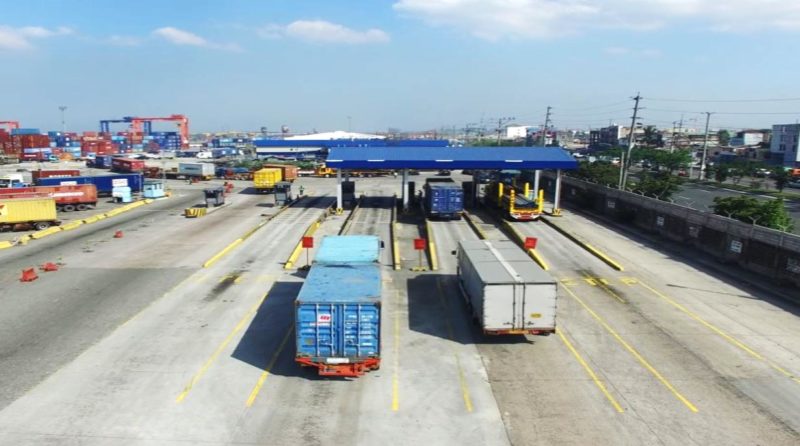
The Philippine Ports Authority (PPA) intends to expand the implementation of the Terminal Appointment Booking System (TABS) to cover all Manila ports.
PPA assistant general manager for operations Hector Miole, in a text message to PortCalls, said the PPA Board has decided to implement TABS in domestic terminal Manila North Harbor and in bulk and breakbulk terminal Harbour Centre.
PPA Commercial Services Department manager Emma Suzara, in an interview with PortCalls after a public consultation July 26 on TABS penalties, said the Board intends to have one TABS system for all of Manila ports.
“What the Board wants is that what is implemented at foreign ports would have to be implemented at the domestic (ports) because they’re only using one road network and this is supposed to be a holistic approach, not just inside the port but the road itself,” Suzara explained.
TABS, a web-based booking system for trucks going to and coming out of the port, has been in place for almost two years at Manila’s two international terminals—Manila South Harbor and Manila International Container Terminal (MICT).
Manila North Harbor Port, Inc. (MNHPI) chief executive officer Richard Barclay, in a meeting on July 26 to inform stakeholders of PPA’s plan, said they received a letter from PPA to attend a meeting and was then directed to execute a terminal appointment booking system, preferably using the system of 1-Stop Connections Pty Ltd, the Australian-based freight and logistics solutions firm that created TABS for the international terminals.
Barclay said they have met with 1-Stop so they could better understand the system but that no agreement has been reached just yet.
Harbour Centre Port Terminal, Inc. (HCPTI) general manager Ferdinand Valdez told PortCalls in a text message they received a memo from PPA directing the port operator of Harbour Centre to adopt TABS.
Valdez said “their (PPA) major intention is to properly manage truck traffic going to port area.”
“Majority of trucks from Harbour (Centre) pass through C3 and NLEX (North Luzon Expressway) so it makes sense to regulate the traffic at our port also,” he added.
Valdez said HCPTI has met with 1-Stop and is now undertaking a gap analysis since the terminal is currently implementing its own booking system called Unified Port Operation Real-time Technology (U-PORT).
“But just in case we use it (TABS), they (stakeholders) will still be using U-PORT at the frontend. U-PORT and TABS will talk at the backend,” he added.
Asked if the system will mean additional costs for the terminal operator and its clients and stakeholders, Valdez said “definitely yes,” as it will entail a monthly charge for HCPTI and a fee for trucks.
Stakeholders at North Harbor, however, voiced opposition to the planned implementation of TABS in the domestic terminal.
While some stakeholders agreed that the concept of TABS is good, they noted peculiarities in North Harbor that should be considered.
Philippine Liner Shipping Association (PLSA), during the MNHPI consultation, said there is no reason to implement TABS in North Harbor, where there is no immediate threat of port congestion. The 2014 port congestion triggered the rollout of TABS.
PLSA also noted lesser volume for North Harbor compared to the combined volumes of Manila South Harbor and MICT. In addition, shipping lines using North Harbor have their own container yards around the terminal and can pull out laden and empty containers or send them to other ports as calls are more frequent. This means, PLSA noted, its members can pull out containers faster and prevent congestion inside the port.
If the objective is to increase efficiency in the terminal, PLSA asked why clients have to pay for the creation and upkeep of a system when ensuring efficiency is part of the operator’s responsibility.
If there are issues with port operations, PLSA said, a port operations committee composed of PPA, MNHPI, and stakeholders can meet to discuss and resolve them.
Truckers at the consultation also saw no reason for TABS to be implemented in North Harbor where volume is “manageable.”
“Currently, I am happy with the operation of MNHPI,” a trucker who did not want to be named said, adding there are “problems arising every now and then” but that these are being resolved.
A customs broker, who also requested anonymity, worried about double booking to transfer a container from Manila South Harbor or MICT to Manila North Harbor. He said this might become a problem if there is a slot available in North Harbor but none in the international terminal or vice versa.
There is too the question of who will make the booking for North Harbor since there are no customs brokers for domestic cargoes. North Harbor handles not only containers but also bulk shipments, and there are trucks that go to the terminal carrying both kinds of shipments.
Previous discussions to implement TABS in the domestic terminal died down due to opposition.
Barclay told PortCalls after the consultation that MNHPI will “continue consultation with the parties and we’ll advise PPA that we’ve had a meeting.” The port operator will also be waiting for direction from PPA on when it will call a public hearing on the plan.
Barclay assured stakeholders they will not implement TABS without public consultation. – Roumina Pablo





